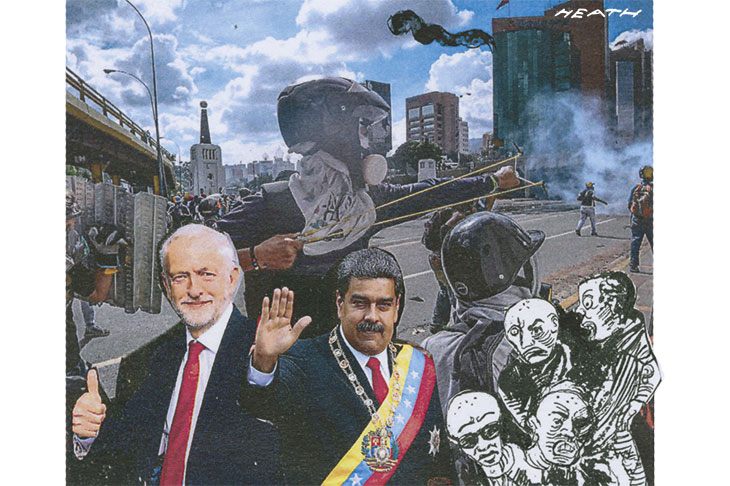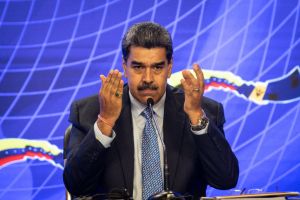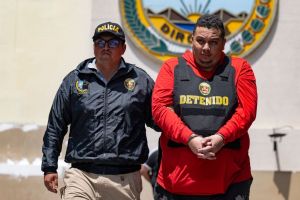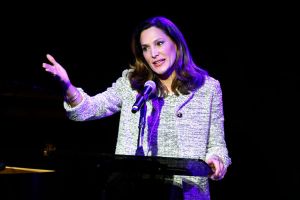A man stopped me in the street in Caracas and grabbed my hand. I was alarmed, but tried not to look scared. This city sometimes ranks as the most dangerous capital in the world. The practical advice we tend to be given by security consultants boils down to ‘Don’t panic’. ‘Gringos,’ said the man, ‘are good people. Thank you. May God bless you.’ And he was gone.
This has been an emotional week for millions of Venezuelans. And there are plenty here who believe the US administration’s endorsement of a rival president means help is on the way; that somehow, someone outside will solve this. The episode reminded me of an equally awkward moment in 2001 in Zimbabwe. Robert Mugabe had ordered the seizure of white-owned farms, and in order to rally his base he and his cronies had spread the rumor that Britain, or more specifically Prince Charles, was planning to lead an invasion and take power. I had been interviewing a group of men outside a farm. They had explained forcefully why land reform was necessary. Then, as we were leaving, one came up to me and asked if the rumor were true. ‘Please tell me it is,’ he whispered.
There are plenty of parallels between Zimbabwe and Venezuela right now. Every couple of decades, some country somewhere in the world goes so off the rails, is so hopelessly mismanaged, that hyperinflation takes root. In the late 1990s it began to rear its voracious head in Zimbabwe. Now it is destroying the Venezuelan economy. The government does not publish inflation figures, but the evidence suggests it is running at about 1.7 million percent. But you won’t see people with wheelbarrows of cash here. It has all run out. Venezuela gets most of its money printed abroad, which presents the dilemma for the government that printing money actually costs real money. That, we think, is why President Maduro never orders enough. Or maybe he really believes inflation can be wished away. Last year he lopped five zeros off the currency, and promised that there would be ten times more cash in the country than anyone could possibly need. A planeload of notes (printed, incidentally, in Basingstoke), arrived in Caracas just before Christmas. By the time the smallest notes entered circulation they were worthless.
Most things are paid for with a debit card or a bank transfer, though that is not always possible, as the internet often fails. But out of the wreckage that has destroyed so many lives here, one other thing is ever more apparent: trust. It is perfectly normal for restaurants or shops to say, ‘Don’t worry, send me a transfer whenever you can.’ The unspoken promise is that you will do so the same day. Leave it 24 hours and the recipient will be short-changed by 10 percent. Almost the only thing that requires cash is public transport and petrol. Maduro has never bothered to increase petrol prices, which means it’s now free. But for the sake of decorum, and a whiff of the normality we all crave, the pump attendants expect you to hand something over, even if it’s valueless. A note worth a fraction of a penny is fine. If not, almost anything will do. An egg. A sweet.
The collapse of the currency means there are two types of Venezuelans now. Those who have dollars. And those who don’t. Those who do are oddly almost overly catered for. In the delicatessens in eastern Caracas, you will see several types of foie gras for sale, Iranian caviar even. The other day, I spotted a bag of ‘organic blue cheese chunks’ apparently made by Amish farmers in New England. Such excesses are aimed at the richest Venezuelans, many of whom are close to the government. The enchufados (meaning ‘plugged-in’) have amassed fortunes — often by taking advantage of the regime’s ludicrous exchange control system, whereby for years there were two official exchange rates, in addition to the black market (i.e. real) one. For most people that meant the bolívar was worthless. But for a corrupt few it meant they could convert their bolívars to dollars at a rate hundreds of times better than their purchase price. Insiders at PDVSA, the state oil monopoly, were best placed to take advantage of the racket. An Italian diplomat told me that a large chunk of the stolen money had ended up in Lake Como property. Last year, the government’s former treasurer, who began his career as the late president Hugo Chávez’s bodyguard, admitted in a US court to laundering $1 billion in bribe money, much of which was received in return for offering favorable exchange rates. Among the assets he surrendered were 60 horses stabled in Palm Beach.
The economic vandalism that has destroyed Venezuela caught the world’s attention when millions of people began to emigrate. But of course most have stayed behind. Many of them still go to work, not because their $8 a month salaries have any meaning, but because habit and dignity are still worth something. Last week I went out to ask people what they thought about the latest triumphalist Maduro pronouncement. I saw a man in a business suit and a neatly ironed shirt. I asked him my question. He paused and apologized. Then he told me he was hungry.
This article was originally published in The Spectator magazine.


















